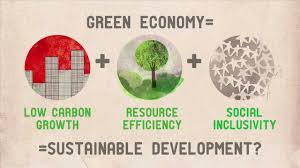The Importance of Sustainable Economic Development
In today’s rapidly changing world, the concept of sustainable economic development has gained significant attention. It refers to the practice of meeting current economic needs without compromising the ability of future generations to meet their own needs. This approach recognizes the interconnectedness of economic, social, and environmental factors in creating a prosperous and equitable society.
Benefits of Sustainable Economic Development
One of the key benefits of sustainable economic development is long-term prosperity. By promoting responsible resource management and reducing environmental impact, countries can ensure the availability of resources for future generations. This approach also fosters innovation and encourages the adoption of greener technologies, leading to a more resilient economy.
Social Equity and Inclusivity
Sustainable economic development aims to create opportunities for all members of society, including marginalized communities. By promoting social equity and inclusivity, countries can reduce poverty, improve access to education and healthcare, and create a more just society. This not only benefits individuals but also strengthens the overall economy by tapping into a diverse range of talents and perspectives.
Environmental Stewardship
Protecting the environment is a crucial aspect of sustainable economic development. By preserving natural resources, reducing pollution, and mitigating climate change, countries can ensure a healthy planet for future generations. Sustainable practices such as renewable energy production, waste reduction, and conservation efforts play a vital role in safeguarding our environment for years to come.
Challenges and Opportunities
While the transition to sustainable economic development poses challenges such as initial investment costs and resistance to change, it also presents numerous opportunities for growth and innovation. Businesses that embrace sustainability are increasingly viewed favorably by consumers and investors, leading to competitive advantages in the global marketplace.
Conclusion
In conclusion, sustainable economic development is not just a buzzword but a necessity for building a better future for all. By balancing economic growth with social equity and environmental stewardship, countries can create thriving economies that benefit both current and future generations. Embracing sustainability is not only an ethical choice but also a strategic one that paves the way for long-term prosperity and well-being.
5 Essential Tips for Driving Sustainable Economic Development
- Promote green technologies and renewable energy sources.
- Support local businesses and fair trade practices.
- Invest in education and training for a skilled workforce.
- Implement policies that prioritize environmental conservation and resource management.
- Encourage innovation and entrepreneurship for long-term economic growth.
Promote green technologies and renewable energy sources.
Promoting green technologies and renewable energy sources is a crucial aspect of sustainable economic development. By investing in clean energy solutions such as solar, wind, and hydroelectric power, countries can reduce their carbon footprint and transition towards a more sustainable energy future. Embracing these technologies not only helps combat climate change but also creates new job opportunities, fosters innovation, and reduces reliance on finite fossil fuels. Incorporating green technologies into the energy mix is a proactive step towards building a greener and more resilient economy for generations to come.
Support local businesses and fair trade practices.
Supporting local businesses and fair trade practices is a crucial step towards promoting sustainable economic development. By choosing to buy from local businesses, consumers can help reduce carbon emissions associated with long-distance transportation and support the growth of their community’s economy. Fair trade practices ensure that producers receive fair compensation for their goods, empowering them to invest in their businesses and communities. This ethical approach not only fosters economic stability but also promotes social equity and environmental responsibility, contributing to a more sustainable and inclusive global economy.
Invest in education and training for a skilled workforce.
Investing in education and training for a skilled workforce is a crucial tip for promoting sustainable economic development. By providing individuals with the knowledge and skills needed to thrive in a rapidly changing economy, countries can enhance productivity, innovation, and competitiveness. A skilled workforce not only drives economic growth but also fosters social mobility and reduces inequality. Education empowers individuals to adapt to new technologies, navigate complex challenges, and contribute meaningfully to their communities. Ultimately, investing in education lays the foundation for a sustainable future built on knowledge, creativity, and inclusive prosperity.
Implement policies that prioritize environmental conservation and resource management.
Implementing policies that prioritize environmental conservation and resource management is a crucial step in promoting sustainable economic development. By safeguarding natural resources and minimizing environmental degradation, countries can ensure the long-term viability of their economies. These policies not only protect ecosystems and biodiversity but also contribute to mitigating climate change and reducing pollution. By incorporating principles of sustainability into decision-making processes, governments can create a more resilient economy that benefits both current and future generations.
Encourage innovation and entrepreneurship for long-term economic growth.
Encouraging innovation and entrepreneurship is a crucial tip for sustainable economic development as it fosters long-term economic growth and resilience. By promoting a culture of innovation, countries can drive technological advancements, create new industries, and enhance productivity. Entrepreneurship, on the other hand, empowers individuals to pursue creative solutions to societal challenges, leading to job creation and economic diversification. Together, innovation and entrepreneurship not only fuel economic expansion but also contribute to building a dynamic and adaptable economy that can thrive in the face of changing global trends.




